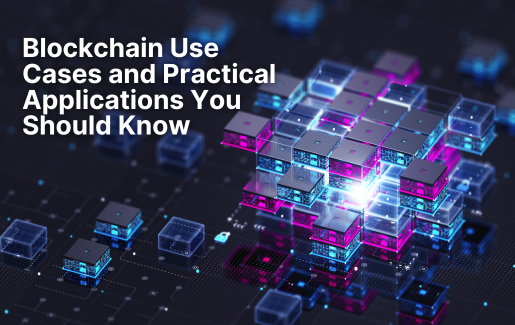 For some, blockchain still feels futuristic—a technology that has far-off implications, but one that is more hype than practicality at the moment. For others, blockchain is already being leveraged and applied for everyday tasks. In a recent webinar, members of the CompTIA Community Blockchain & Web3 Advisory Council demonstrated how they have made the jump from hype to reality. From government applications to data integrity and secure transfer, blockchain is enabling more secure data protections, trusted verifications and end-to-end visibility. This is some of its real-world use cases.
For some, blockchain still feels futuristic—a technology that has far-off implications, but one that is more hype than practicality at the moment. For others, blockchain is already being leveraged and applied for everyday tasks. In a recent webinar, members of the CompTIA Community Blockchain & Web3 Advisory Council demonstrated how they have made the jump from hype to reality. From government applications to data integrity and secure transfer, blockchain is enabling more secure data protections, trusted verifications and end-to-end visibility. This is some of its real-world use cases.
Related: Listen to the full webinar
What Is Blockchain?
Despite all the technical jargon, blockchain is a technology that enables secure transactions while creating an immutable record of those transactions—meaning the records can’t be changed or deleted. It has revolutionized the way data is stored and shared using cryptography and a zero-trust approach.
Benefits of Blockchain
- Permissionless or permissioned access
- Cryptography and enhanced security
- Transparency
- Distributed storage
- Automated code
What Is Blockchain Used For?
- Data capture
- Data transfer
- Data storage
- Data sharing
- Data insights
Technology leaders have taken these benefits and capabilities and applied them to real-life situations. Here are some of the leading use cases in enterprise blockchain.
Privacy Protection with Blockchain
In recent years, we have continued to see more legislation hit the lawbooks to help individuals take control over their privacy. This has been a difficult task to tackle given the uptick in identity theft, phishing scams and unsafe password practices. But Elena Dumitrascu, CTO and co-founder at Credivera and past chair of the Blockchain & Web3 Advisory Council, and her team have launched a blockchain application that improves identify verification in response to more stringent data protection regulations.
“In the last years, privacy has been at the forefront,” said Dumitrascu. “Countries around the world have started enacting legislation to protect our privacy and technology companies have started producing solutions that support that legislation.”
Legal Issues Related to Blockchain
When it comes to using blockchain, there are two sides to the legal coin—the opportunity to own and verify data and the regulatory risk to blockchain providers. Enrico Schaefer, UAV & IP attorney with Traverse Legal and member of the Blockchain & Web3 Advisory Council, discussed how enterprises need to approach legal issues when it comes to blockchain.
Data privacy certainly creates issues for enterprises who are hoping to leverage blockchain technology. “Being able to control your data is one of the opportunities that blockchain presents,” said Schaefer. “On the other side, if you’re a platform or an app that is capturing end-user personal data, then you’ve got to deal with the compliance issues for GDPR and CCPA, which in many ways are inconsistent with blockchain because blockchain is immutable.”
Schaefer recommends a few considerations for those looking to use blockchain:
- Smart contract legal enforceability: Contracts put onto the blockchain will need to be clearly written with legal precedents in mind if there is any hope of enforcing the agreements. Additionally, there will need to be options for updates to terms and conditions.
- Intellectual property: Blockchain provides an opportunity to track licensing and chain of ownership when it comes to intellectual property.
- Jurisdictional challenges: Because blockchain breaks down geographical barriers, it can be difficult to identify which jurisdiction things fall into when it’s time to enforce legal restrictions or contracts.
- Anti-money laundering compliance issues: Blockchain is notorious for money laundering due to the anonymity factor so Schaefer recommends companies comply with AML regulations.
- Tokens and securities regulations: Companies need to be aware of securities regulations if they plan to sell tokens as it may cause legal backlash.
“Depending on what you are using the blockchain technology for is going to determine what legal issues you are going to have to address,” said Schaefer.
Cloud Computing with Blockchain
Blockchain can also be used to help democratize technology. Wes Jensen, board member at 21Packets and member of the Blockchain & Web 3 Advisory Council, discussed the limitations of cloud computing and how blockchain is helping to remove those barriers.
Right now, the cloud computing market is dominated by a handful of big tech providers. The limited ownership creates numerous issues, including:
- High costs and barriers to those in developing countries
- Regional censorship limiting access to those with permissions
- Security vulnerabilities where clusters are at risk for exploit
- Service trust and transparency where individuals are prohibited from verifying quality of service, server location and privacy
The solution comes in the form of P2PCloud, a decentralized marketplace that lets companies connect with others in a way that poses no security risk to their environments and helps to lower costs while democratizing access.
“We essentially put together a trusted execution environment that encrypts not only the virtual machine, but it also leverages the crypto wallet for transaction and creates a trustless interaction between not only the host, but also the client and creates a distributed cloud infrastructure globally,” said Jensen.
Government Applications for Blockchain
Benefits are also being leveraged at the government level. Curtis O’Neal, founder at Cybernetics Global and chair of the council, said applications can help to enhance government programs.
“The government’s spending on blockchain solutions is being projected at $19 billion by 2024,” said O’Neal. “Every municipality should have a plan in place. If they’re not thinking about it, they’re already too late.”
Because the government uses a zero-trust approach, blockchain is ideally suited for the following use cases:
- Supply chain asset management and provenance tracking: This allows for transparency into the provenance of goods and prohibits internal and external tampering within the supply chain.
- U.S. Customs and Border Control: Blockchain provides data-level interoperability across multiple blockchains which saves billions of dollars in border processing times and helps to combat intellectual property violations. It also enables end-to-end traceability of goods and people across borders by connecting border access across land, sea and air.
Public Data Storage with Blockchain
Yet another benefit of blockchain technology can be applied to data storage. Katie Zhee, founder of Web3 CloudX and council chair, delved into the benefits of data integrity with blockchain.
“Blockchain provides a framework for trust and there are different ways that businesses can leverage blockchain,” Zhee said. One of those ways involves using an open source, distributed and fully decentralized network to store data in its original form, something that is particularly useful in the age of deep fakes and AI data manipulation.
For example, one public blockchain company, Starling Labs, is using the Holocaust as a pilot project that is currently running to ensure that historical narratives retain their integrity, Zhee said. The project aims to make information public and accessible without the fear of manipulation.
“Data growing exponentially year over year is only increasing,” Zhee said.
Regular use of blockchain is just on the horizon. How will you use it in your business? Check out these related resources for more information on how to get started or continue your journey:
- Blockchain Terminology: A Glossary for Beginners
Learn the basic terminology for blockchain technology. From Address to Zeppelin, here’s the entire list of terms beginners need to know.
- Understanding Decentralized Digital Identity & Self-Sovereignty
Understanding decentralized digital identity is important for MSPs serving financial services, healthcare, government, education and e-commerce.
- What Is Web 3? Here Are 5 Core Values
Web 3 is the third generation of the World Wide Web, structured around five core values, according to the CompTIA Community Blockchain & Web3 Advisory Council.
Join the conversation.
Learn more about the CompTIA Community Blockchain &Web3 Advisory Council.

 Add CompTIA to your favorite RSS reader
Add CompTIA to your favorite RSS reader

